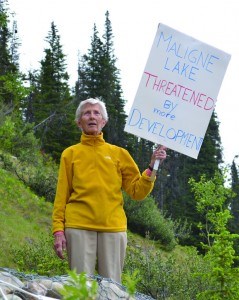
Visitors to Maligne Lake were confronted with more than breathtaking scenery June 29, as a group of protestors braved the spitting rain to show their displeasure with the proposed development at the lake.
The group was comprised largely of members of the Jasper Environmental Association (JEA), an organization that has come out strongly against proposed developments to the visitor services Maligne Tours Ltd. operates at Maligne Lake.
The proposal, which is still in its conceptual stage, includes a 66-room hotel, 15 tent cabins and a number of “experiential highlights” such as canoe excursions and Aboriginal-themed storytelling.
Maligne representatives have said that the existing lodge at Maligne Lake is in dire need of upgrades, and their proposed developments will allow visitors to get much more out of their Maligne experience.
The proposal is currently being considered by Parks Canada, which is expected to release a decision on whether or not the changes can happen very soon.
The protestors’ aim on Sunday was to get signatures on a Canadian Parks and Wilderness Society (CPAWS) petition that urges the federal government to say no to the proposed developments.
CPAWS, and the members of JEA collecting signatures for them, say the proposed changes - especially those that will allow visitors to stay overnight - will have a significant impact on the sensitive wildlife that frequent the Maligne Valley, and set a dangerous precedent for allowing commercial development in national parks.
The Maligne Valley is home to a number of sensitive species, including woodland caribou (which The Committee on the Status of Endangered Wildlife in Canada recently recommended be put on the endangered species list), grizzly bears (which are a threatened species in Alberta) and harlequin ducks.
“We’re extremely concerned about Maligne Lake. Not only have we now got an endangered species up there, the whole business of the precedent is going to open these national parks up - there’s no doubt about it,” explained Jill Seaton, a member of the JEA.
During their pre-protest pow-wow in the Maligne Canyon parking lot, the group of about ten stood in a loose circle, going over their plan of attack.
One protestor leaned over a sign in his van, bolding the bright red letters. “Maligne Lake Threatened By More Development,” it read. Another, leaning against the van door said: “Support Nature, Not Development.”
In order to maximize the impact, the group decided to spread out along the length of Maligne Road, every five or so kilometres, with certain members camping at strategic locations at the Medicine Lake viewpoint and Maligne boathouse chatting people up and getting their message out.
“Remember everyone, smiles, smiles, smiles!” Seaton said as everyone climbed into their cars to go to their designated locations.
At the Medicine Lake viewpoint, Ursula Winkler carried a sign over her shoulder, and canvassed the gathered tourists, asking for signatures.
“I’ve been trying to engage people through storytelling,” she said. Between speeches she talked about how important the natural landscape of Jasper is to her, and how critical she feels it is to protect it.
“I passionately love this landscape. I passionately love this, and we have an obligation to our children and towards the future generations. When we talk future for all, it is much more than human beings - it is people and animals and forests and water... It is way bigger than people,” she said.
She admitted that sometimes it can be hard to engage people when you show up with signs - people don’t like to get involved in controversy - but over the course of about half an hour she collected many signatures, and raised several eyebrows with her explanations of the proposed developments.
Seaton said that she feels her groups’ efforts to raise awareness have so far been successful.
“One of the things that people ask - they look at you sort of horrified when you say there’s going to be a hotel there, and say ‘don’t you have laws that prevent that- to stop those kinds of things happening in a national park?’
“And the only answer we have to that is we thought we did.”
Trevor Nichols
[email protected]
